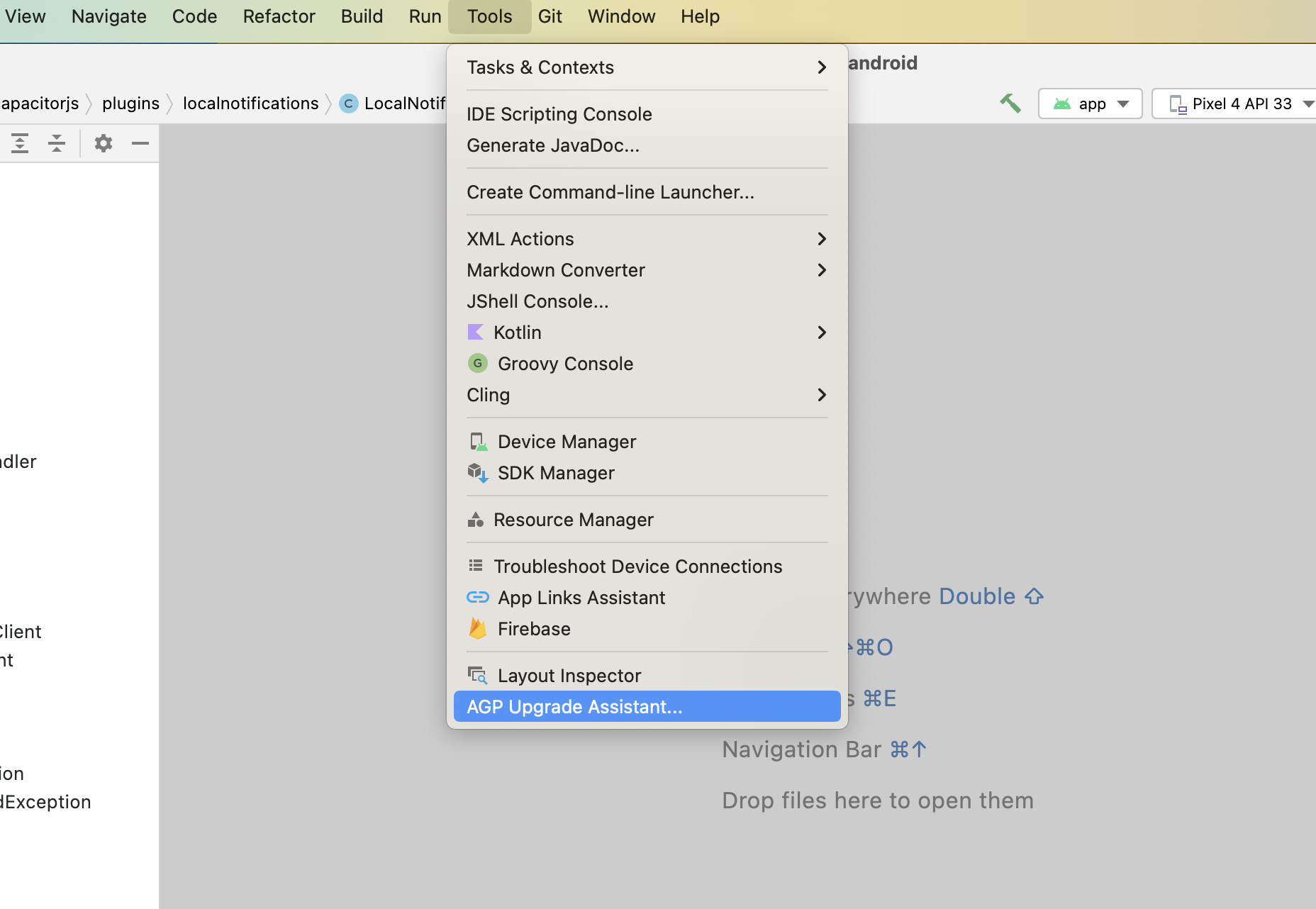Updating from Capacitor 5 to Capacitor 6
The breaking changes between Capacitor 5 and 6 are designed to be extremely minimal. In this guide, you'll find steps to update your project to the current Capacitor 6 version as well as a list of breaking changes for our official plugins.
NodeJS 18+
Node 16 has reached end-of-life as of September 11th, 2023. Capacitor 6 requires NodeJS 18 or greater. (Latest LTS version is recommended.)
Using the CLI to Migrate
Install the latest-6 version of the Capacitor CLI to your project:
npm i -D @capacitor/cli@latest-6
Once installed, simply run the following to have the CLI handle the migration for you.
npx cap migrate
If any of the steps for the migration are not able to be completed, additional information will be made available in the output in the terminal. The steps for doing the migration manually are listed out below.
Using the VS Code Extension to Migrate
If you have the VS Code extension installed, simply check out the recomendations section of the extension to find the option to migrate your project to Capacitor 6.
iOS
The following guide describes how to upgrade your Capacitor 5 iOS project to Capacitor 6.
Upgrade Xcode
Capacitor 6 requires Xcode 15.0+.
SPM Support
Converting from using Cocoapods to SPM is a pretty large topic we will cover in a different article, coming soon.
Register custom plugins
In Capacitor 6, plugin classes are no longer automatically registered. For npm installed plugins, the CLI will generate a list of plugin classes to register them programmatically. But users following the custom code guide for creating local plugins not distributed through npm, they will have to create a custom view controller and register their plugins.
Zooming
To match Android behavior, iOS apps are no longer zoomable by default. To enable zooming, check zoomEnabled configuration option
Android
The following guide describes how to upgrade your Capacitor 5 Android project to Capacitor 6.
Upgrade Android Studio
Capacitor 6 requires Android Studio Hedgehog | 2023.1.1 or newer because of the usage of Gradle 8.2.
Once it's updated, Android Studio can assist with some of the updates related to gradle and moving package into build files. To start, run Tools -> AGP Upgrade Assistant.

Update Android Project Variables
In your variables.gradle file, update your values to the following new minimums
minSdkVersion = 22
compileSdkVersion = 34
targetSdkVersion = 34
androidxActivityVersion = '1.8.0'
androidxAppCompatVersion = '1.6.1'
androidxCoordinatorLayoutVersion = '1.2.0'
androidxCoreVersion = '1.12.0'
androidxFragmentVersion = '1.6.2'
coreSplashScreenVersion = '1.0.1'
androidxWebkitVersion = '1.9.0'
junitVersion = '4.13.2'
androidxJunitVersion = '1.1.5'
androidxEspressoCoreVersion = '3.5.1'
cordovaAndroidVersion = '10.1.1'
Update google services plugin
# build.gradle
dependencies {
classpath 'com.android.tools.build:gradle:8.0.0'
- classpath 'com.google.gms:google-services:4.3.15'
+ classpath 'com.google.gms:google-services:4.4.0'
Update gradle plugin to 8.2.1
# build.gradle
dependencies {
- classpath 'com.android.tools.build:gradle:8.0.0'
+ classpath 'com.android.tools.build:gradle:8.2.1'
Update gradle wrapper to 8.2.1
# gradle-wrapper.properties
distributionBase=GRADLE_USER_HOME
distributionPath=wrapper/dists
- distributionUrl=https\://services.gradle.org/distributions/gradle-8.0.2-all.zip
+ distributionUrl=https\://services.gradle.org/distributions/gradle-8.2.1-all.zip
zipStoreBase=GRADLE_USER_HOME
zipStorePath=wrapper/dists
Update androidScheme
In Capacitor 6, https is the default setting for androidScheme for existing apps to better enable Capacitor applications to make use of the system Autofill feature.
Changing the scheme is the equivalent to shipping your application on a different domain, which means any data stored in in cookies, localstorage, etc would no longer be accessible. To avoid data loss as a result of this change, if you didn't have a androidScheme entry in your Capacitor config file already set to https, you should set the scheme to http.
{
server: {
androidScheme: "http"
}
}
If you already had a androidScheme entry set to https, you can safely remove it now.
Update kotlin version
If your project is using kotlin, update the kotlin_version variable to '1.9.10'.
Plugins
The following plugin functionality has been modified or removed. Update your code accordingly.
For all plugins that had listeners, addListener now only returns a Promise, if you were storing the call result in a variable without using await, your code will no longer compile.
Action Sheet
androidxMaterialVersionvariable has been updated to1.10.0.
Camera
- Version 6 of Capacitor Camera plugin now uses the Photo Picker API, which no longer requires to declare camera permissions, unless using
saveToGallery: true. If this is false, you can remove the following permissions fromAndroidManifest.xmlif no other plugin requires them.
<uses-permission android:name="android.permission.READ_MEDIA_IMAGES"/>
<uses-permission android:name="android.permission.READ_EXTERNAL_STORAGE"/>
<uses-permission android:name="android.permission.WRITE_EXTERNAL_STORAGE" />
- On Android, if the user cancels picking images from the gallery, the error returned is now
"User cancelled photos app"as on the other platforms. androidxMaterialVersionvariable has been updated to1.10.0.
Filesystem
- iOS now returns
ctimeandmtimeas numbers instead of strings, as all the other platforms.
Geolocation
NSLocationAlwaysUsageDescription(Privacy - Location Always Usage Description) is deprecated and can be removed from theInfo.plist.playServicesLocationVersionvariable has been updated to21.1.0.
Google Maps
- iOS native libraries have been updated, check this for more details
NSLocationAlwaysUsageDescription(Privacy - Location Always Usage Description) is deprecated and can be removed from theInfo.plist.googleMapsPlayServicesVersionhas been updated to18.2.0.googleMapsUtilsVersionhas been updated to3.8.2.googleMapsKtxVersionhas been updated to5.0.0.googleMapsUtilsKtxVersionhas been updated to5.0.0.kotlinxCoroutinesVersionhas been updated to1.7.3.androidxCoreKTXVersionhas been updated to1.12.0.kotlin_versionhas been updated to1.9.10.
Local Notifications
- On Android 14 the notifications are not exact by default even if using
<uses-permission android:name="android.permission.SCHEDULE_EXACT_ALARM" />permission, see this for more details
Push Notifications
firebaseMessagingVersionvariable has been updated to23.3.1.
Share
androidxCoreVersionvariable has been updated to1.12.0.
Splash Screen
coreSplashScreenVersionvariable has been updated to1.0.1.
Status Bar
androidxCoreVersionvariable has been updated to1.12.0.